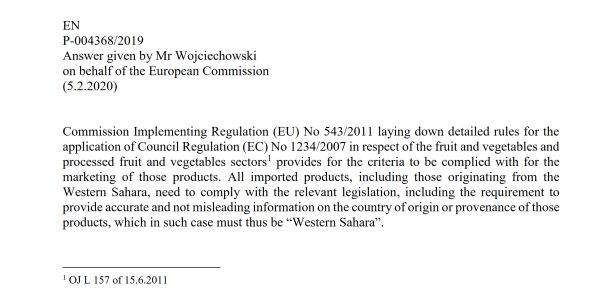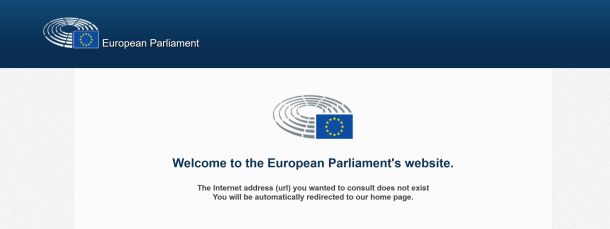To recap: in December 2016, the Court of Justice of the European Union (CJEU) struck down the application of the EU-Morocco trade deal in occupied Western Sahara, because Morocco has no sovereignty over the territory nor any international mandate to administer it. Since Western Sahara is a third country to the EU's bilateral deal with Morocco, its people ought to consent in order to have any such deal affect their land - as a corrolary of their right to self-determination.
Rather than simply excluding Western Sahara from its arrangements with Morocco - following the example of how the United States and the EFTA countries relate to Moroccan trade - the EU then proceeded to negotiate an amendment to the deal with Morocco, with the purpose of henceforth explicitely mentioning Western Sahara as part of the scope of the agreement. Such a move, the EU Commission argued, would align the agreement with the CJEU ruling.
The people of Western Sahara weren't asked a thing. In an attempt to make it seem as if the people of Western Sahara had consented to the proposal, the EU Commission and the EU External Action Service (EEAS) set up a consultation process. In that process, 18 Moroccan stakeholders took part; all either business owners in occupied Western Sahara or politicians elected in the territory via elections held by Morocco. But in the documentation on the consultation that the Commission and EEAS presented to the EU Parliament and the EU Council, 94 groups were listed as having been consulted - though in reality, they never took part in any consultation talk. This included, among others, our own organisation WSRW, 89 Saharawi civil society groups, and the UN recognised representation of the people of Western Sahara, the Polisario Front. The untruthful list of stakeholders is included as an annex to the Staff Working Document, a document sent to the EU Parliament and EU Member States containing the Commission's arguments in favour of the deal.
It should be clear that a consultation in no way, shape or form can substitute the people of Western Sahara's right to consent. But the Commission and EEAS have always argued that it was "impossible" to obtain the consent of the people of Western Sahara, and that they have done everything in their power to carry the best possible fall-back option: a consultation of stakeholders. Only, under Article 11 of the Treaty on the European Union, the Commission has to "carry out broad consultations with parties concerned in order to ensure that the Union's actions are coherent and transparent". So hardly a special effort - rather an obligation to do a consultation anyway.
And as it turns out, the Commission and EEAS then even carried out the consultation exercise in violation of their own guidelines on the subject. Find those guidelines here. The guidelines were adopted in 2015 as part of the Better Regulation Guidelines, extending the Commission's range of stakeholder engagement methods to enable stakeholders to express their view over the entire lifecycle of a policy.
VIOLATION OF "GENERAL PRINCIPLES AND MINIMUM STANDARDS FOR CONSULTATION"
Stakeholder consultations are governed by a set of principles and minimum standards. The Commission has disregarded the bulk of them in its consultation on the proposed amendment to the EU-Morocco trade deal, aimed at formally incorporating occupied Western Sahara in the scope of the deal.
The first principle underpinning consultation exercises is that of "participation", where the EU Commission is to “adopt an inclusive approach by consulting as widely as possible”.
Ignoring the people of Western Sahara completely, while negotiating the incorporation of part of their land in a trade deal with the military occupier of that stretch of land, cannot be matched with the principle of participation. The Saharawi people have not been involved at all during the entire negotiation process – from conceptualisation all the way to inking the negotiated text, which was done with Morocco.
Saharawi civil society groups have not been included in the consultation process. As stated by the EEAS, only groups that have been registered by the Moroccan government were invited to take part, which immediately rules out practically all Saharawi groups in the occupied territory - bar two who have received some form of registration in 2015 after Morocco had received severe criticism for not registering Saharawi groups in the UN Human Rights Council. Note that both those groups, ASVDH and Al Ghad, have issued statements that they would not participate in a consultation process that undermines their right to self-determination. Critically, the Saharawis living in the refugee camps - having fled the very areas where the Moroccan king cultivates produce that is exported to the EU - are not even heard at all.
The representation of the people of Western Sahara, the Polisario Front, was never invited to take part in a consultation process (though a meeting with the EEAS, at Polisario's own initiative, would be used by the EEAS to make it seem as if Polisario had been consulted. See below.)
Again, it should be evident that a mere consultation process cannot replace that legal requirement of consent. But it is incomprehensible that the people with the sovereign right to the land and its resources are not even considered a stakeholder to an arrangement that purports to lump that land into a deal with another country.
The second governing principle of stakeholder consultations is “openness and accountability”, to be interpreted as “make the consultation process and how it has affected policymaking transparent to those involved and to the general public”.
It is hard to see how this principle squares with blatantly lying about the participation of the Frente Polisario, Saharawi civil society, and solidarity groups like WSRW. None of the aforementioned actors have taken part in the Commission’s consultation on the trade deal, yet the Commission included all of them as having been consulted in its documentation on the process to the EU Council and the EU Parliament.
A meeting with Polisario on 5 February 2018 - held at the initiative of Polisario, no less and thus NOT part of any consultation exercise - is strangely introduced in the list as a consultation meeting. WSRW has asked the European External Action Service in February 2018 what the agenda of the meeting with Polisario was, if the agenda was communicated to Polisario in advance, and has not yet received a response. In the meeting, Polisario condemned the EU's approach of entering into an agreement with Morocco over Western Sahara.
In its Staff Working Document, the Commission has included an entire section entitled "result of consultations with the Polisario Front". Consultations that never took place.
Not only was the false information about Polisario circulated to the EU Parliament and Member States: it was also given to Saharawi groups. One Saharawi association negative to the Moroccan illegal occupation received an invitation from the European Commission to a "consultation with a widest possible selection of parties [...] and it is in this sort of exchange of views whereto you are invited to take place, in the same manner as we have already undertaken discussions with Front Polisario on 5 February in Brussels". However, that is a lie, as Polisario never took part in any consultation.
Western Sahara Resource Watch was surprised to see its own name in the list of associations that had rejected taking part in a consultation process, as our association has never been invited to a such process. WSRW was indeed invited to an "informal meeting", which we turned down for two reasons. First, WSRW does not speak for the people of Western Sahara, and second, the people of Western Sahara had not consented to the deal – a requirement set forth in the CJEU rulings.
No less than 89 Saharawi civil society groups had sent a letter to the EU Commission, rejecting the approach of negotiating a deal with Morocco for their homeland without the consent of their political representation, Polisario. The Commission simply added these groups to the list of "consulted stakeholders".
As a result, 83% of the groups listed as "consulted", had never taken part in the consultation. Hardly transparent.
Another principle to be upheld when carrying out a stakeholder consultation, is “effectiveness”, which is defined as “consult at a time where stakeholder views can still make a difference, respect proportionality and specific restraints”.
It is hard to see how it is possible for any stakeholder to still "make a difference", when only approached at a time when the proposed deal has already been inked. The EU Commission only sent sketchy emails, which did not even spell out the purpose of consultation, to Polisario and WSRW when the it had already initialed the amended trade deal with Morocco. What difference would a consultation make, at this point in the process?
An additional standard is "clarity", requiring that all communication and the consultation document itself should be clear, concise and include all necessary information to facilitate responses.
WSRW is not aware of any such documents. Furthermore, the email that WSRW received from the EEAS was rather oblique on the purpose of the meeting we were invited to. The word "consultation" was not part of the email. The point of the meeting was thus not clearly spelled out.
VIOLATION OF KEY REQUIREMENTS GOVERNING PRACTICAL IMPLEMENTATION OF GUIDELINES
The consultation was part of an impact assessment, trying to gauge the effects of the deal on the Western Sahara economy. In that framework, the key elements of the consultation "should be outlined prior to requesting validation and be outlined in the roadmap/inception impact assessment on which stakeholders can provide feedback".
WSRW has not seen any roadmap published by the Commission, inviting feedback on the proposed change to the EU-Morocco trade deal.
After that initial feedback period, the Commission is required to provide a 12 week internet-based public consultation as part of its consultation strategy. Standard practice is to do this via a specific consultation webpage, linked to on various EU websites.
No such website was created on the issue of formally expanding the EU-Morocco trade deal into another country, without the consent of the people of that country.
Further requirements, such as making sure the consultation is available in all EU languages (or at least in English, French and German), allowing stakeholders to provide feedback on every part of the (thus not-existing) roadmap, etc... were also not respected.
EU Commission backtracks on labelling Western Sahara goods
What is EU's position on labelling of products from occupied Western Sahara? The EU Commission has now for the third time published a response to a parliamentary question on the matter, but the latest version fails to address the question.
Why does this EU statement keep disappearing?
A clarification by the EU Commission on labelling of products from Western Sahara was published, then removed, then published again and has now been removed again from EU websites.
EU reaffirms: Western Sahara products to be labelled as such
Two weeks ago, the EU Commission announced that products from Western Sahara should be labelled accordingly, only to withdraw that statement the very next day. Today, the Commission reaffirms its original position.
Spectacular backtracking by EU Commission on Western Sahara labelling
On 5 February 2020, the EU Commission announced that products from Western Sahara should be labelled accordingly. But about 24 hours later, all traces to that statement had been removed from EU websites.



